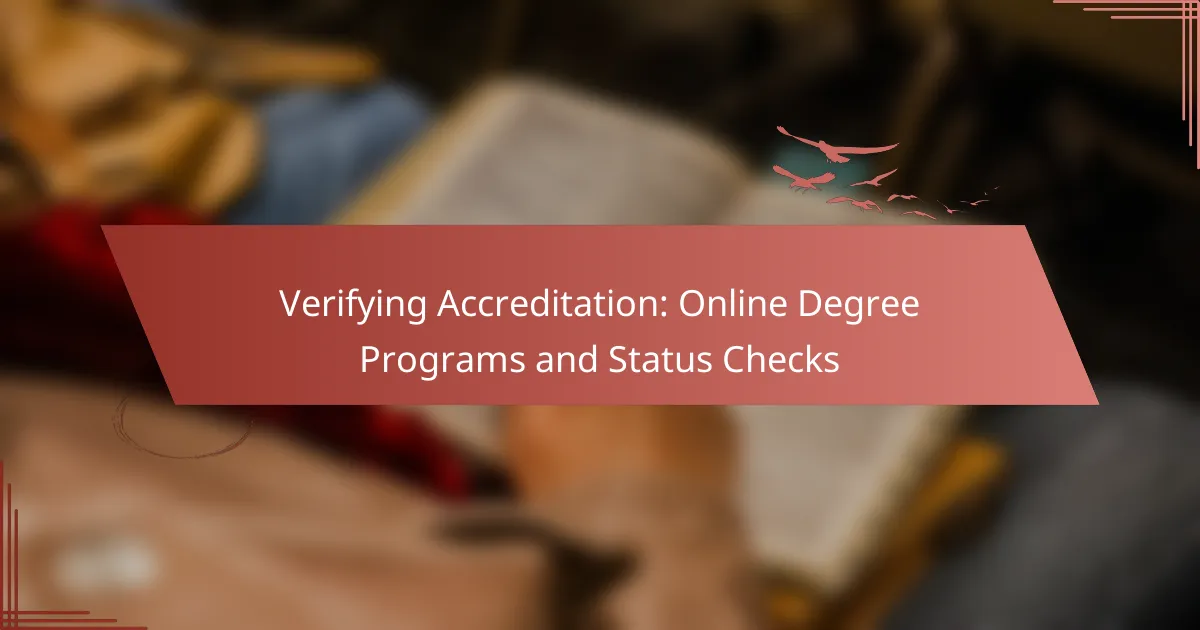Verifying the accreditation of online degree programs is essential for ensuring that the education you receive meets recognized academic standards. Utilizing official databases and resources can help you confirm the legitimacy of a program, which can significantly impact your career prospects and access to financial aid.

How to Verify Accreditation for Online Degree Programs
To verify the accreditation of online degree programs, you should utilize official databases and resources that provide reliable information about educational institutions. This process ensures that the program you are considering meets recognized academic standards and can enhance your career prospects.
Check the U.S. Department of Education database
The U.S. Department of Education maintains a comprehensive database of accredited institutions and programs. You can access this database online to search for specific schools and verify their accreditation status. Look for the institution’s name and ensure it is listed as accredited.
When using the database, pay attention to the type of accreditation—regional or national—as this can impact the recognition of your degree. Regional accreditation is generally considered more prestigious and widely accepted by employers and other educational institutions.
Use the Council for Higher Education Accreditation (CHEA) resources
The Council for Higher Education Accreditation (CHEA) offers a searchable database that complements the U.S. Department of Education’s resources. This database includes information on recognized accrediting organizations and the institutions they accredit. Utilizing both resources can provide a more complete picture of an institution’s credibility.
CHEA also publishes reports and updates on accreditation trends, which can be useful for understanding the landscape of online education. Familiarizing yourself with these resources can help you make informed decisions about your educational path.
Contact the institution directly
If you have questions about a specific online degree program’s accreditation, contacting the institution directly can provide clarity. Reach out to the admissions office or the registrar to ask about their accreditation status and the accrediting body involved.
Be sure to inquire about the implications of their accreditation for your degree, such as transferability of credits and eligibility for federal financial aid. This direct communication can help you avoid potential pitfalls and ensure that the program aligns with your educational and career goals.

What are the benefits of accredited online degree programs?
Accredited online degree programs offer several advantages, including enhanced credibility, better job prospects, and access to financial aid. These programs meet established educational standards, making them more recognized by employers and institutions.
Increased job opportunities
Graduating from an accredited online degree program significantly boosts your job prospects. Employers often prefer candidates with degrees from accredited institutions, as these programs are seen as more rigorous and reliable.
For example, many companies in fields like healthcare, education, and engineering require candidates to hold degrees from accredited programs to ensure quality and compliance with industry standards. This can lead to a wider range of job openings and potentially higher salaries.
Eligibility for federal financial aid
Students enrolled in accredited online degree programs are typically eligible for federal financial aid, including grants and loans. This financial support can help cover tuition costs and reduce the burden of student debt.
To qualify for federal aid, students must complete the Free Application for Federal Student Aid (FAFSA). Being enrolled in an accredited program is a key requirement for accessing these funds, making accreditation a crucial factor for many students.
Transferability of credits
Accredited online degree programs often allow for easier transfer of credits between institutions. If you decide to change schools or pursue further education, having credits from an accredited program can facilitate the process.
For instance, if you complete a portion of your degree at one accredited institution and wish to transfer to another, the receiving school is more likely to accept those credits. This can save time and money, enabling you to complete your degree more efficiently.

Which organizations provide accreditation for online degrees?
Accreditation for online degrees is granted by various organizations that assess educational institutions and programs for quality and standards. Understanding the types of accrediting bodies is crucial for prospective students to ensure their degree holds value in the job market.
Regional accrediting agencies
Regional accrediting agencies are the most recognized bodies in the United States, focusing on institutions within specific geographic areas. These agencies evaluate the overall quality of the institution, including its academic programs, faculty qualifications, and student services.
Examples of regional accrediting agencies include the Higher Learning Commission (HLC) and the Southern Association of Colleges and Schools Commission on Colleges (SACSCOC). Attending a regionally accredited institution is often preferred by employers and can be essential for transferring credits to other colleges.
National accrediting organizations
National accrediting organizations typically focus on specific types of institutions, such as trade schools or online colleges. They assess programs based on industry standards and often cater to vocational or career-oriented education.
Examples include the Accrediting Commission of Career Schools and Colleges (ACCSC) and the Distance Education Accrediting Commission (DEAC). While national accreditation can be valuable, it may not carry the same weight as regional accreditation when it comes to credit transfer or graduate school admissions.
Program-specific accrediting bodies
Program-specific accrediting bodies evaluate individual programs within institutions, ensuring they meet industry standards and prepare students for professional practice. This type of accreditation is common in fields such as nursing, engineering, and business.
For instance, the Accreditation Commission for Education in Nursing (ACEN) accredits nursing programs, while the Association to Advance Collegiate Schools of Business (AACSB) focuses on business schools. Students should consider program-specific accreditation if they aim to enter a regulated profession or seek specialized knowledge.

What are the common misconceptions about online degree accreditation?
Many people mistakenly believe that online degree programs lack accreditation or quality. Understanding these misconceptions is crucial for prospective students to make informed decisions about their education.
All online degrees are unaccredited
This misconception is widespread but inaccurate. While some online programs may not be accredited, many reputable institutions offer fully accredited online degrees. It’s essential to verify the accreditation status of any program you consider.
To check accreditation, visit the institution’s website or consult recognized accrediting agencies. Look for regional or national accreditation, as these are typically more respected in the job market.
Accreditation guarantees job placement
Accreditation does not guarantee job placement, although it can enhance employability. Employers often value degrees from accredited programs, but they also consider experience, skills, and the job market’s demands.
To improve job prospects, focus on gaining relevant experience through internships, networking, and developing skills that are in high demand in your field.
Only traditional schools are accredited
Accreditation is not exclusive to traditional brick-and-mortar institutions. Many online universities and colleges are accredited by recognized agencies, ensuring that their programs meet specific educational standards.
When researching online programs, verify their accreditation status just as you would for a traditional school. This ensures that your degree holds value in the job market, regardless of the delivery method.

How to choose an accredited online degree program?
Choosing an accredited online degree program involves verifying the institution’s accreditation status and ensuring it meets recognized educational standards. Look for programs that are accredited by regional or national accrediting bodies, as this can significantly affect the value of your degree in the job market.
Evaluate program reputation
Research the program’s reputation by checking rankings, student reviews, and alumni success stories. Accreditation from a reputable agency often indicates a quality program, but also consider feedback from current and former students regarding their experiences.
Utilize resources like online forums, social media groups, and educational websites to gather insights. A program with a strong reputation may offer better networking opportunities and employer recognition.
Assess faculty qualifications
Review the qualifications of faculty members teaching in the program. Look for instructors with advanced degrees, relevant industry experience, and a track record of research or professional accomplishments in their fields.
Programs that feature faculty who are active in their professions often provide students with current knowledge and valuable connections. Consider reaching out to faculty if possible to gauge their responsiveness and willingness to support students.
Review student support services
Examine the student support services offered by the program, including academic advising, tutoring, and career services. Strong support systems can enhance your learning experience and help you succeed in your studies and future career.
Check if the program provides access to online resources, such as libraries and technical support. Programs that prioritize student success often have dedicated staff to assist with various needs, making your online education more effective and enjoyable.

What are the steps to check the accreditation status of an online degree?
To check the accreditation status of an online degree, start by identifying the accrediting agency responsible for the program. This ensures that the institution meets recognized educational standards and can provide a valid degree.
Identify the accrediting agency
The first step in verifying accreditation is to find out which agency has accredited the online degree program. Most legitimate institutions will list their accrediting bodies on their official website or in promotional materials.
Look for agencies recognized by the U.S. Department of Education or the Council for Higher Education Accreditation (CHEA). These organizations ensure that the programs meet specific educational criteria.
Access the agency’s official website
Once you have identified the accrediting agency, visit its official website to verify the accreditation status. Most agencies provide a searchable database where you can confirm if the institution is listed as accredited.
Check for any recent updates or changes in accreditation status, as institutions may undergo periodic reviews. Ensure that the agency is legitimate and recognized to avoid misinformation.
